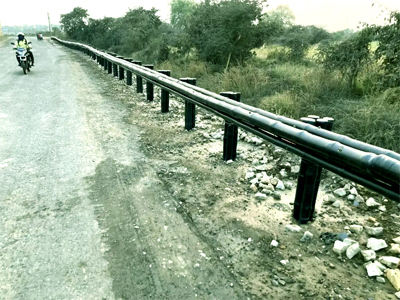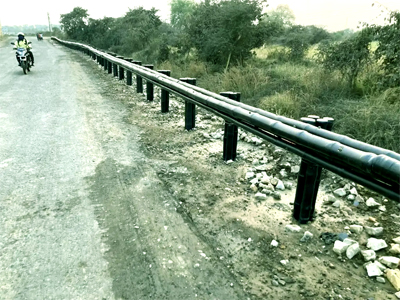
Govt to use 'Bahu Balli' Bamboo Barriers replacing steel barriers on Highways
Agartala, Jul 28, 2023, By Our Correspondent411

In a move aimed at promoting eco-friendliness and supporting the bamboo industry, the Indian government has decided to replace steel barriers on highways with special 'Bahu Balli' barriers made of bamboo. The announcement was made by Road Transport Minister Nitin Gadkari during the Question Hour in the Rajya Sabha.
Gadkari highlighted the benefits of using bamboo barriers, stating that not only are they environmentally friendly, but they will also contribute to the growth of the bamboo industry and generate employment opportunities for people in the northeast and tribal regions of the country. A pilot project has already been initiated in Chhattisgarh, and the minister stated that the implementation of bamboo barriers will soon extend to other states as well.
The decision to use bamboo barriers is part of the government's efforts to bolster the bamboo industry while ensuring safety and access control on highways. Currently, steel barriers, mild steel sections, and welded steel wire mesh are commonly used for fencing near the Right of Way (RoW) boundary on expressways to prevent the entry of pedestrians, animals, and vehicles. However, in a step towards sustainable infrastructure, the Ministry issued guidelines in 2019 to provide precast concrete boundary walls in these areas. Now, the ministry has received a proposal and placed an order for feasibility and demonstration of 'Bahu Balli' bamboo fences.
Minister Gadkari emphasized the potential benefits for rural areas, as farmers will have the opportunity to grow bamboo on wastelands. Additionally, he highlighted the various uses of bamboo, such as in the production of ethanol, pickles, and textiles in Assam. Drawing a comparison with China's thriving bamboo economy, Gadkari expressed optimism that India could also establish a robust bamboo economy and promote the use of bamboo barriers on roads. He believes that the success of bamboo cross-barriers will be advantageous to tribals and rural communities, providing them with sustainable and locally sourced resources.
The decision to replace steel barriers with bamboo barriers marks a significant step towards sustainability and supporting local industries, and it is expected to contribute positively to environmental conservation and rural livelihoods.